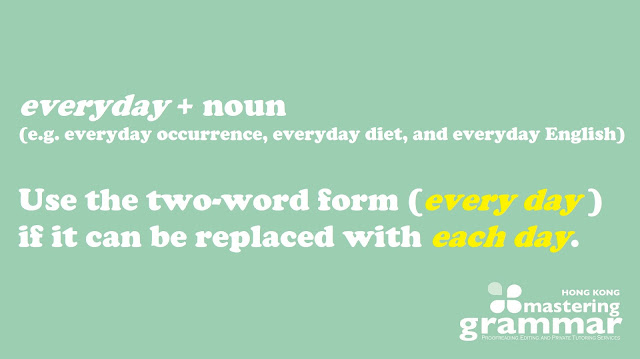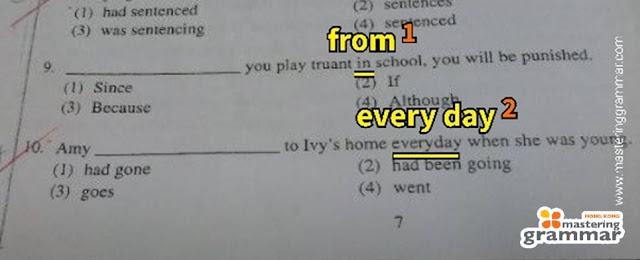Are you confused about when to use everyday and every day? This blog post will clarify the difference and help you get it right.
The Difference between Everyday and Every Day
Everyday is an adjective meaning 'commonplace' or 'ordinary'. It should be used before a noun:
✅ Most people prefer to wear everyday clothes.
✅ Computers are a part of everyday life.
✅ Everyday activities like walking and doing housework are beneficial for your health.
However, people often mistakenly use this one-word form in situations that require two words:
❌ Tom listens to music everyday.
✅ Tom listens to music every day.
❌ They go to the coffee shop everyday.
✅ They go to the coffee shop every day.
❌ I spend some time everyday reading newspapers and books.
✅ I spend some time every day reading newspapers and books.
Every day is an adverbial phrase that indicates how often an action takes place:
✅ Luke plays football every day.
✅ I go for a morning run every day to start my day off right.
✅ My brother and I talk on the phone every day, even if it's just for a few minutes.
Tips for Remembering the Difference between Everyday and Every Day
 |
| Everyday (1 word) means 'commonplace' or 'ordinary'. Every day (2 words) means 'each day'. |
I hope you have found this content helpful in your English learning journey. If so, please consider supporting this blog by buying me a coffee. Your contributions greatly help in maintaining the blog and are highly appreciated!
Examples from the Media
Shifting to a low-carbon economy will profoundly change the everyday lives of Canadians. —Toronto Star (2021)
I resolved to swim a kilometre in a local ocean pool every day. —The Sydney Morning Herald (2021)
At other restaurants [in hotels] because of rotating schedules, it can be rare to have the chef and manager working on the same day, and yet guests are paying the same price every day. —South China Morning Post (2021)
Related Posts
'Everyday' or 'Every Day'? Which One Is Correct?
Practice
In the following sentences, decide whether the given expression should be one word or two.
1. I am bored with my everyday/every day routine.
2. It is good to read everyday/every day.
3. He goes to the library everyday/every day.
4. Going to the library is his everyday/every day activity.
5. My wardrobe mainly consists of everyday/every day clothing like jeans and T-shirts.
Answer Key
1. everyday 2. every day 3. every day 4. everyday 5. everyday
Real-World Examples of Misuse
 |
| (Source: WeChat) |
 |
| 1. It is more common to use the definite article the when referring to playing a musical instrument, as evidenced by data from Google Ngram. 2. The original sentence contained a comma splice, where two independent clauses were incorrectly linked by a comma. By removing it is and the comma, and connecting the clauses more directly with because, the sentence is now both smoother and grammatically correct. 3. Everyday (one word) is an adjective meaning 'common' or 'ordinary', as in everyday activities. In contrast, every day (two words) is used to indicate something occurring each day. 4. In standard English, the adverb quickly is required to modify the verb drove. (Source: Seko 思高) |
 |
| (Source: English Examiner for Junior Forms, Book 1A) (Also by the Same Author: 1/2/3/4/5) |
 |
| 1. I believe that this was the intended meaning of the sentence. In other words, we don't want to do this, but we have to. 2. But is not used with although or even though. 3. Every day should be two separate words in this sentence. (Also by the Same Author: 1/2/3/4/5/6/7) |
 |
| 1. A person plays truant from school. To play truant is to stay away from school without permission. 2. The two-word form every day should be used in this sentence. |
 |
| 1. Every day should be two separate words in this sentence. 2. The indefinite article is typically omitted when referring to meals like breakfast, lunch, and dinner in this context. 3. In general, a singular countable noun (e.g. infinitive) should be preceded by a determiner such as an, the, and that. (Source: Learning through Practice—Grammar and Usage for Senior Secondary Students: Multiple Choice Questions) (Also by the Same Author: 1/2/3/4/5) |
















.jpg)


2 Comments
Very helpful thanks
ReplyDeleteI'm glad you found it helpful.
Delete